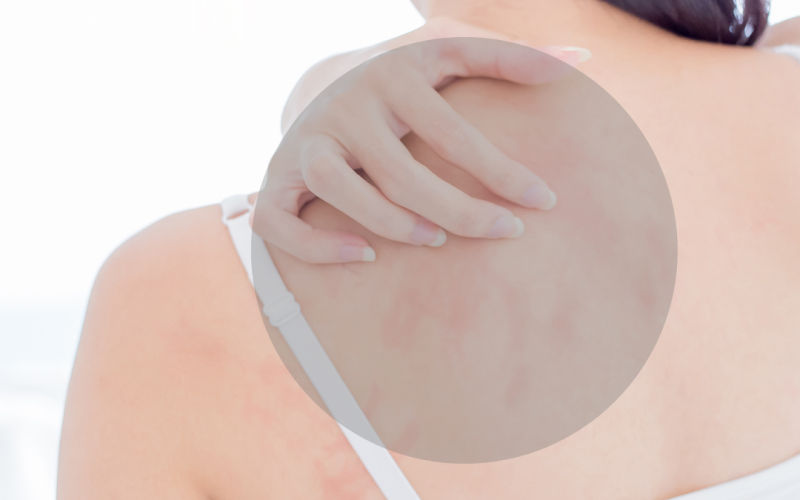Atopic dermatitis (eczema) is an incurable, chronic skin condition that causes severe itching and flaking. If you’ve experienced eczema, you know how difficult it can be to live with the rash, which can lead to anxiety about being in public or getting new flare-ups if you accidentally touch things that trigger your skin’s allergies.

But don’t worry; there are plenty of ways to help avoid eczema flare-ups and manage your allergy symptoms so you can get back to life as normal as quickly as possible!
1) Wear loose-fitting, breathable clothing
One of the most common recommendations for eczema is to wear loose-fitting, breathable clothing. Clothing that fits tightly against the skin can lead to a buildup of heat and sweat which may irritate your skin.
Loose-fitting, porous materials can allow air flow and help keep you cool during the warmer months. In winter, it’s important that you dress in layers so that you can keep your body temperature regulated throughout the day.
Be sure to choose fabrics that are soft and lightweight so they don’t put any added pressure on sensitive areas.
Avoid synthetic fabrics like polyester because they are made from manmade fibers which do not allow air to flow through them as easily as natural fibers like cotton or wool. Keep an eye out for patches of dry, red or raised skin and use hydrocortisone ointment if these patches start to itch.
2) Avoid harsh soaps and detergents
-Detergents and soaps can cause dry, cracked skin. -The most common triggers for eczema are wool, lanolin, and perfume. Avoid these by making sure your clothing is not made of those materials. -Detergents containing sodium lauryl sulfate have been linked with the development of eczema.
Soaps are intended for cleaning dirty things, but too much soap can dry out skin and make it flaky. If you have eczema, try bathing with just water. You may also want to consider switching from a soap to a cream or lotion cleanser, as these may be less irritating to your skin than soaps or detergents. Detergents containing sodium lauryl sulfate can make eczema worse.
3) Keep your skin moisturized
One way to avoid eczema flare-ups is by keeping your skin moisturized. Moisturizing your skin from head to toe every day can help reduce the frequency of eczema flare-ups. The best time for daily moisturizing is at night before you go to bed, so that you are well hydrated for 8 hours. You can also apply a heavy coat of oil or cream during the daytime when you know you will be spending a lot of time outdoors in dry air or windy weather, such as skiing or sailing.
4) Avoid irritants
- Avoid irritants, such as soaps and detergents, which can cause the skin to dry out.
- Consider using a humidifier in your bedroom, especially in winter.
- Reduce your consumption of acidic foods like tomatoes, oranges, lemons and grapefruit.
- Don’t scratch! If you do itch or need to scratch an area that’s inflamed, try moisturizing with lotion first before scratching.
5) Reduce stress
Stress is one of the biggest triggers of eczema flares, so learning how to reduce stress will not only help you stay healthy but also help you maintain your sanity.
If you’re dealing with a stressful situation, take time for yourself and indulge in some self-care activities like going for a long walk or taking a hot bath. Try to avoid overworking and reaching deadlines by prioritizing sleep and eating healthy foods.
6) Use a humidifier
Moisture is the key to preventing eczema flare-ups. If you have eczema, it’s important that you use a humidifier in your bedroom as well as other rooms where you spend time during the day. You should also try using a humidifier in your baby’s room if he or she has eczema.
7) Take warm baths
Taking a warm bath with colloidal oatmeal can help ease the itchiness of eczema and reduce inflammation. Make sure you use warm, not hot water, and that the water is not too long or deep. Use soap sparingly and avoid anything with fragrances or other additives that could irritate your skin.
8) Apply topical corticosteroids
Topical corticosteroids are one of the most effective treatments for eczema. These medications are applied directly to the skin and should be used on a regular basis until symptoms have subsided. For some, this could take as little as 3 days while others may need up to 8 weeks of daily use. Once your eczema has gone away, you can reduce the frequency of use or stop altogether.
9) Try immunosuppressant drugs
Some medications that may help your dermatitis are ciclosporin, azathioprine, and methotrexate. These drugs suppress the immune system and are used in people with severe eczema or other skin diseases that have not responded to other treatments.
These drugs are associated with a range of side effects including fatigue, nausea, vomiting, diarrhea, headache and low blood counts which can increase the risk of infection.





